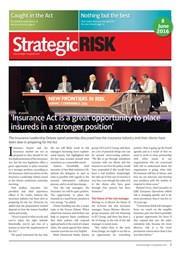Airmic members report higher levels of interest from top management

Top management are increasingly more engaged with risk, although risk management is not yet integrated with corporate strategy nor risk education into other business units.
These are some of the main findings of Airmic’s annual member survey. Only 6% of respondents see lack of access to the board as a big challenge, compared to 11% last year. Most members also reported greater support and leadership from the board on risk issues, although 15% still highlighted a lack of leadership/support as a major concern.
The survey also shows intangible risks continue to be the main concerns for risk managers, with cyber risk occupying the top two slots for the first time. The three key risk areas for Airmic members are: cyber causing business interruption (46% cited this as a top-three concern); cyber causing loss or theft of personal data (44%); and reputation (31%).
Insurance cover for these types of risk is more difficult to acquire, the survey reveals. More than half of respondents have not taken out a cyber insurance policy, despite only 20% having a high level of confidence in their organisations’ ability to manage these risks.
The main reasons for not buying cyber insurance are inadequate coverage, relevant insurance being unavailable and high cost (especially for theft/loss of data). Take-up of reputation-related insurance is even lower, at 4%, with lack of availability of relevant cover the main factor.
When asked to assess the insurance market, respondents said they were most concerned about lack of innovation, cited by 59%, which has more than doubled in two years. This was followed by broker conflicts of interest (41%) and errors and delays in documentation (41%). However, many risk managers have also noticed advances in the insurance market, with greater capacity (63%), better prices (59%), wordings (47%), improved limits (45.5%) and greater relevance (34%) all mentioned.
The number of members saying that claims had been queried on grounds of late notification in the previous three years has risen from 28% in 2014 to 44% this year. Since insurance buyers’ practices are unlikely to have changed much, claims departments appear to be adopting a new, more challenging approach, Airmic said.
The association also surveyed its members on their preparedness for the Insurance Act. A majority of 71.5% of respondents are reviewing internal processes for collecting information to meet the fair presentation requirements, 43% have reviewed policy documentation and 21% already contract to the requirements of the Act. Only 9% had still to prepare for it.
The new legislation will likely help reduce the number of claims issues, as Basis Clauses will be made unlawful under the Act. One in five members reported having had difficulties with a claim in the past three years and among those, 26% cited these clauses as a reason for having had a claim challenged, reduced, delayed or declined. One in three said it was because they had been unable to provide information required by the insurer.
Commenting on the results of the survey, Airmic chief executive John Hurrell said: “These results confirm the trend towards the intangible risks that insurers find more difficult to cover. Addressing these perils requires an enterprise risk management approach much wider than pure risk transfer. Nonetheless, the findings underline the importance of our work with our partners in the insurance world to develop the products that would increase their relevance to corporate UK in the future.
“The survey also shows that boards are taking a genuine interest in risk as never before, representing a great opportunity for our members to extend their influence within their own organisations. Helping them to respond through relevant guidance and training, frequently developed in co-operation with other professional bodies, will continue to be one of our priorities.”




















No comments yet